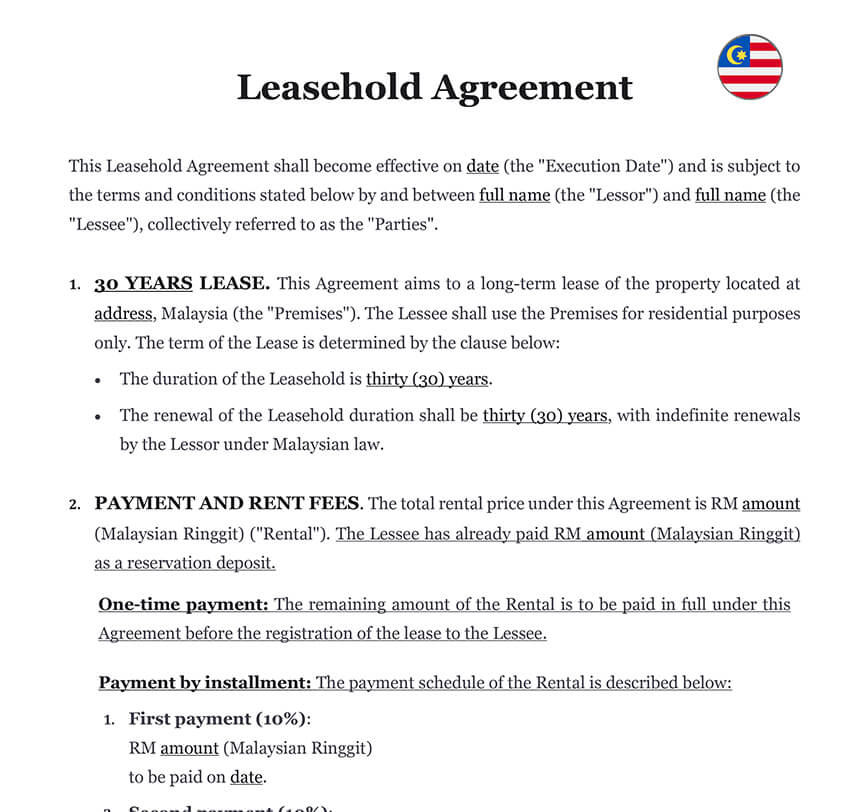Ready to use legal template
Drafted by experienced lawyers
Compliant with Hong Kong law
Ready to use legal template
Drafted by lawyers
Compliant with Hong Kong law
Home › Rent your property › Leasehold
Learn more about Leasehold Agreement in Hong Kong
A Leasehold Agreement is a legal contract between a landlord and tenant, where the landlord grants the tenant the right to occupy and use a property from 50 years to 99 years in exchange for rent. This type of agreement is commonly used for both residential and commercial leases and outlines the terms and conditions of tenancy, including rent payments, maintenance responsibilities, and the duration of the lease. It is crucial for protecting the rights of both parties and ensuring clear expectations throughout the lease period. A well-drafted leasehold agreement helps to prevent disputes and provides a solid foundation for tenancy arrangements. To ensure legal compliance and avoid potential issues, download our Leasehold Agreement template, designed by experienced lawyers and easily editable in Word format, fully compliant with Hong Kong law.
Table of contents
-
What is a Leasehold Agreement in Hong Kong?
-
What is included in this Leasehold Agreement?
-
How long can a Leasehold Agreement last in Hong Kong?
-
Can a Leasehold Agreement be terminated early?
-
What are the responsibilities of the tenant in a Leasehold Agreement?
-
What are the landlord’s obligations in a Leasehold Agreement?
-
How is rent typically structured in a Leasehold Agreement?
-
Can a Leasehold Agreement be renewed after it expires?
-
How do I amend a Leasehold Agreement in Hong Kong?
What is a Leasehold Agreement in Hong Kong?
A Leasehold Agreement in Hong Kong is a legally binding contract between a landlord (lessor) and a tenant (lessee)that grants the tenant the right to occupy and use a property for a fixed period in exchange for rent. Unlike freehold ownership, where the owner holds indefinite rights over the property, leasehold arrangements are time-limited, with typical lease durations ranging from 20 to 50 years, depending on the property type and location.
These agreements are governed by Hong Kong property laws and land lease regulations, and they must comply with provisions outlined in documents such as the Landlord and Tenant (Consolidation) Ordinance. A standard leasehold agreement outlines critical terms such as lease duration, rental payments, renewal options, maintenance responsibilities, and any restrictions on property use.
Understanding the legal implications and practical limitations of a leasehold agreement is essential for both landlords and tenants, as it ensures clarity, protects their respective rights, and helps avoid future disputes. In a market like Hong Kong where the vast majority of land is government leasehold mastering the leasehold structure is key to navigating real estate with confidence.For more details, see the official guide from the Rating and Valuation Department.
What is included in this Leasehold Agreement?
| ➤ 50 Years Lease: This clause defines the term of the lease, which is set for 50 years, with provisions for renewal, ensuring the lessee has long-term security of the leased property. The renewal of the leasehold is subject to Hong Kong law and local property regulations. |
| ➤ Payment and Rent Fees: This clause outlines the total rental amount and payment structure, including both one-time and installment payments, along with the responsibilities for timely payments and potential penalties for late payments under Hong Kong law. |
| ➤ Registration of Lease: This clause ensures the lease will be registered at the relevant land office in Hong Kong after full payment, which protects the lessee’s rights to the property. It also discusses the Lessee’s obligation for payment of registration fees, stamp duties, and other associated costs. |
| ➤ Consent to Sublease: This clause allows the Lessee to sublease the property or share it under certain conditions, while maintaining responsibility for the property’s condition and obligations throughout the lease term under Hong Kong tenancy laws. |
| ➤ Lessee’s Covenants: This clause outlines the Lessee’s responsibilities, including rent payments, restrictions on construction or alterations, and the requirement to allow inspections by the Lessor, all in compliance with Hong Kong property management regulations. |
| ➤ Entire Agreement: This clause confirms that this Leasehold Agreement contains the entire understanding of the Parties, replacing any prior agreements or discussions, and binds the Parties to its terms until the lease term concludes in accordance with Hong Kong law. |
| ➤ Governing Law and Jurisdiction: This clause specifies that the agreement is governed by Hong Kong law, and any disputes arising will be resolved under the jurisdiction of the courts in Hong Kong, ensuring legal clarity for both Parties in case of disputes. |




